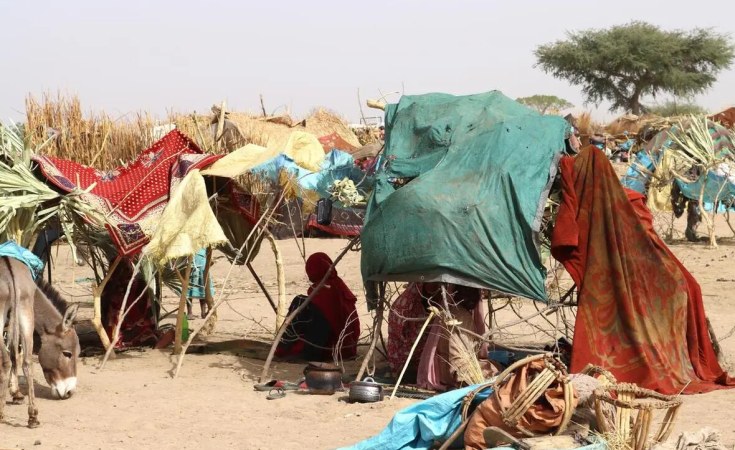Russian mercenaries appear to be working closely with the military junta in Sudan. Billions of dollars have allegedly been circumvented in exchange for political and military support from the Kremlin.
"The Russians buy almost everything," Omar Sheriff, a miner in the northeastern Sudanese town of Al-Ibaidiya, told DW shortly before the current conflict between Sudan's armed forces and the Rapid Support Forces (RSF) paramilitary group began.
Sheriff is one of dozens of artisanal miners in Al-Ibaidiya, a town on the bank of the Nile River located about 400 kilometers (248 miles) north of the capital Khartoum, who labor in searing heat to cut gold from rocks in the desert. They separate the gold from the rocks using chemical processes involving toxic substances like cyanide leaching and mercury that can harm both the miners and the environment.
Most of the gold ends up in a processing plant 16 kilometers away run by a company owned by the founder of Russia's paramilitary Wagner Group, Yevgeny Prigozhin, a close friend of Russian President Vladimir Putin.
"The Russians can pay close to $4,000 (Ꞓ3,620) for a truckload of gold," says Sheriff. "They are often desperate to buy everything."
Wagner Group in Sudan at dictator's invitation
The Wagner Group first surfaced in Sudan in 2017 at the invitation of then-President Omar al-Bashir following a meeting between the Sudanese dictator and Putin in Moscow.
The private military organization set up Meroe Gold, a Prigozhin-controlled company which was later sanctioned by the United States, to run its operations in the African nation. Shortly afterwards, it began to explore Sudan's gold resources.
In the process, Wagner began to build a relationship with General Mohammed Hamdan Dagalo, commonly known as Hemeti, and his paramilitary RSF. Members of the RSF, according to locals in Al-Ibaidiya, gave protection to Russian merchants who sought to buy gold from miners. The Russian-owned gold processing plant is also said to be guarded by several RSF paramilitaries who work closely with Russian security personnel believed to be from the Wagner Group.
"For more than four years we've seen RSF soldiers working closely with the Russians," Mustafa El Tahir, who has been mining gold in al-Ibaidiya since 2018, told DW. "Anywhere the Russians go, RSF goes with them."
Wagner maintained its relationship with Hemeti after the Sudanese pro-democracy movement toppled al-Bashir in 2019. His ouster paved the way for a transitional civilian government. That relationship appeared to be instrumental in overthrowing the civilian-led government nearly two years later. Following the coup, allegedly supported by Russia, army General Abdel Fattah Burhan took over as military leader making Hemeti his deputy.
Plane with gold bullion
Since the military's return to power, Wagner's collaboration with Hemeti has picked up. In February 2022, as Russia launched its invasion of Ukraine, Hemeti traveled to Moscow to give his backing to Russian plans to set up a navy base on the Red Sea, a move Burhan refused to endorse.
On that trip to Russia, the plane Hemeti traveled in was also transporting gold bullion, according to the New York Times, citing two senior Western officials. During the talks in Moscow, Hemeti reportedly requested help from Russian officials to acquire military equipment.
In 2021, as much as 32.7 tons of Sudanese gold worth about $1.9 billion was unaccounted for, according to a report by US broadcaster CNN. The report also found evidence that shows that Russia has worked closely with Sudan's military junta to ensure that billions of dollars in gold bypass the Sudanese treasury in exchange for the Kremlin's political and military backing.
"All the while, this corrupt scheme involving the Wagner Group and the military government has been supervised by Hemeti," says Ahmed Abdallah, a Sudanese human rights campaigner in exile in Germany. "It always felt like both men [Hemeti and Burhan] were never on the same page regarding how to do business with Wagner."
Now, a new report suggests that Wagner has been supplying the RSF with missiles to support their fight against the Sudanese military.
Last week, CNN reported that the open-source group "All Eyes on Wagner" had analyzed satellite images which appeared to show a Russian transport plane shuttling between two key Libyan airbases controlled by Khalifa Hifter, leader of the eastern Libyan National Army, who is backed by the Wagner Group.
Wagner Group's dealings remain murky
The report alleged that an increase in activity by the Wagner Group at the airbases suggests that there was a plan by both Russia and Hifter to back the RSF even before the conflict started.
"Behind Hemeti's push could be the Wagner Group, whose personnel was arrested and accused of gold smuggling by the Burhan regime just before the fighting began," Yaser Abdulrehman, a Sudanese lawyer told DW. "Hemeti and Wagner are like Siamese twins."
But the Wagner Group's true intentions appear to remain unclear.
"While it appears that the Wagner Group has offered Hemeti military assistance, the Wagner Group's involvement in this conflict remains opaque," Isabella Currie, a researcher on the Wagner Group, told DW.
"Caution is advised in drawing conclusions about a potential alliance between Wagner and Hemeti, or Wagner's role in stoking civil unrest in Sudan. Instability in Sudan may not serve to benefit either the Putin regime or Prigozhin's network, particularly if the conflict begins to impact Sudan's border with the Central African Republic, where Prigozhin has established relationships and resource extraction contracts," she said.
Edited by: Rob Mudge


